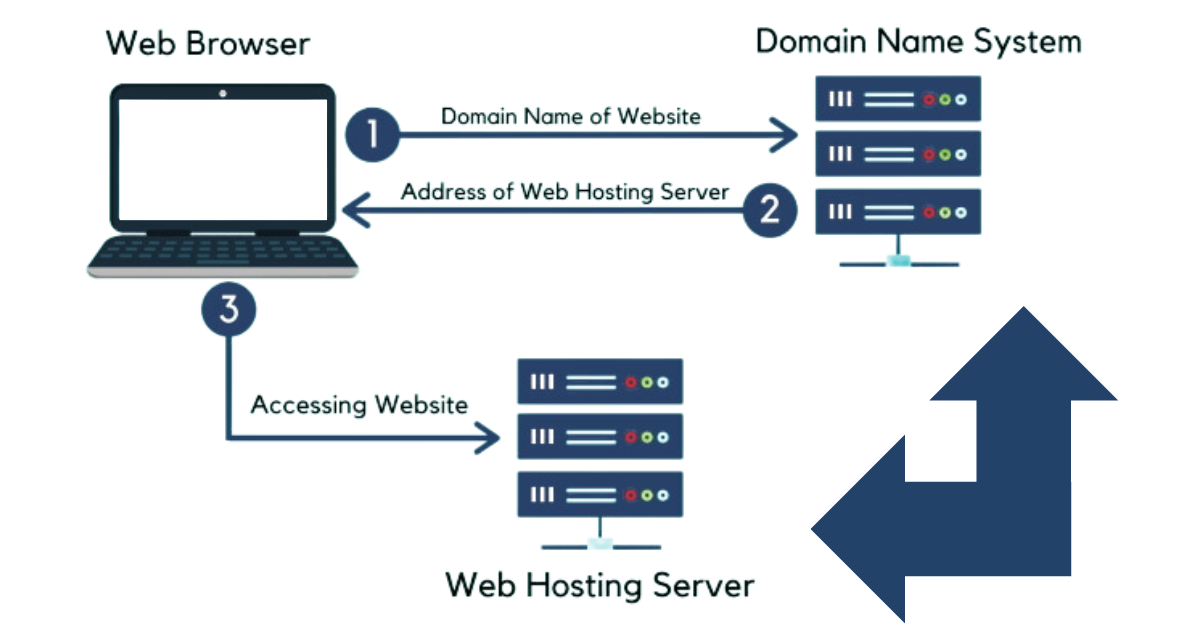For the owner of a website, web hosting and domain hosting are two necessities. The service that keeps your website’s files safe and makes them available to internet users is called web hosting. The service that registers your domain name and maintains ownership records is called domain hosting. A domain name is the online address of your website, like wikipedia.org or google.com.
Introduction of Web hosting
Making your website available to internet users is possible with the help of web hosting. It is in charge of providing access to your website’s files for anybody who accesses its domain name. It functions similarly to the physical location where your website’s files are kept. Your computer makes a request to the server hosting a website whenever you view it. The files for the website are then downloaded by the server and sent back to your computer, where your browser displays them.
Types of web hosting
There exist various varieties of web hosting, each possessing unique benefits and drawbacks. Shared hosting, the most popular kind of web hosting, is a fantastic choice for tiny websites and blogs. Other kinds of website hosting consist of:
- VPS hosting: Virtual private server hosting is referred to as VPS hosting. Compared to shared hosting, this kind of web hosting offers you greater freedom and control. Your website is assigned its own virtual server when you use VPS hosting. This can enhance the functionality and security of your website because you won’t have to share resources with other websites.
- Dedicated hosting: The priciest kind of web hosting is dedicated hosting, but it also offers you the greatest freedom and control. When you choose dedicated hosting, your website has its own physical server. This implies that you have exclusive access to all of the server’s resources, which can provide the highest level of security and performance for your website.
- Cloud hosting: A kind of web hosting called cloud hosting stores your website on a network of servers. Cloud hosting is now very scalable and dependable as a result. With cloud hosting, you may quickly add or remove resources as needed, and even in the event that one of the network’s servers fails, your website will always remain operational.
Benefits of web hosting
There are many benefits to using a web hosting service, including:
- Reliability: Web hosting companies offer the resources and know-how to keep your website operational around the clock.
- Security: Many security solutions are available from web hosting companies to shield your website from malware and hackers.
- Performance: Web hosting companies have the means to guarantee that your website loads rapidly and works well for users.
- Support: If you experience any issues with the hosting of your website, web hosting companies provide assistance.
How to choose a web hosting provider
When choosing a web hosting provider, there are a few things to keep in mind:
- Type of web hosting: Think about the kind of web hosting that best suits your requirements. While VPS hosting, dedicated hosting, and cloud hosting are better suited for larger websites and enterprises, shared hosting is a fine choice for smaller websites and blogs.
- Features: Think about the features that are essential to you, such as email hosting, disk space, bandwidth, and support for particular programming languages.
- Price: To get the greatest value, compare the costs of several web hosting companies.
Introduction of Domain Hosting
The service that hosts and maintains your domain name is called domain hosting. A domain name is the online address of your website, like wikipedia.org or google.com. Without a domain name, visitors would have to enter your website’s IP address into their web browser, which is inconvenient and hard to remember.
Types of domain names
There are many different types of domain names available, but the most common are:
- .com: All sizes of businesses and organizations use this most common sort of domain name.
- .net: Websites and IT companies frequently utilize this kind of domain name.
- .org: Non-profits and other kinds of organizations frequently use this kind of domain name.
- .edu: Educational institutions frequently utilize this kind of domain name.
- .gov: Websites and government bodies typically utilize this kind of domain name.
Benefits of domain
There are many benefits to using a domain hosting service, including:
- Professionalism: Your website appears more genuine and professional with a personalized domain name.
- Brand recognition: Your website and company can benefit from increased brand recognition thanks to a unique domain name.
- Email addresses: Using your domain name, you may create personalized email addresses like [email protected].
- Website control: Your domain name is entirely in your control, and you are free to move it at any moment to a new web hosting company.
How to choose a domain hosting provider
When choosing a domain hosting provider, there are a few things to keep in mind:
- Price: Usually, domain hosting is a pretty cheap service. To get the best value, it’s crucial to examine the costs offered by various name-hosting companies.
- Features: Email forwarding and domain privacy protection are two extra options that some domain hosting companies offer. When selecting a domain hosting company, take into account the characteristics that are crucial to you.
- Customer support: Select a domain hosting company that provides excellent customer service in the event that you run into issues with your domain name or hosting account.
Why are both web hosting and domain important?
Because they are necessary to enable online visitors to view your website, web hosting and domain hosting are both significant.
Web hosting
The service that keeps your website’s files safe and makes them available to users is called web hosting. Your website would not be accessible online without web hosting.
- gives you the option to open your website to online visitors.
- gives the files on your website somewhere to live.
- gives the traffic on your website bandwidth.
- hosts emails and offers additional services.
Domain
The service that registers your domain name and maintains ownership records is called domain hosting. A domain name is the online address of your website, like wikipedia.org or google.com. Without a domain name, visitors would have to enter your website’s IP address into their web browser, which is inconvenient and hard to remember.
- enables domain name registration for your website.
- offers services for DNS management.
- prevents the public publication of your personal information in the domain registration database.
Your website would not be accessible online without web hosting. People could not find your website if you did not have domain hosting.
Difference Between Web Hosting and Domain Hosting
Setting up a website involves two separate but connected elements: web hosting and domain hosting. They have several functions and are necessary to enable internet accessibility for a website. Here’s how the two can be distinguished clearly:
Web Hosting
- The service that offers the infrastructure required for your website to be stored and accessible online is known as web hosting.
- Files, databases, and other content for your website are kept on servers and in data centers.
- Web hosting companies provide a variety of hosting services with differing resource and administration options. These services include shared hosting, cloud hosting, VPS hosting, and dedicated hosting.
- Your website’s functionality, dependability, and speed are all under the control of web hosting. The overall user experience and loading times of your website can be greatly impacted by your choice of web hosting.
- It offers features including technical assistance, server management, security, bandwidth, and storage.
Domain
- On the other side, domain hosting is the service that gives your website a distinct, easily readable URL. Users enter this (e.g., www.yourwebsite.com) into their browsers to visit your website.
- It entails using a domain registrar to register a domain name (such as “yourwebsite.com”). Domain registrars are firms that are authorized to handle domain name registration and management.
- You can direct your domain name to your web hosting server’s IP address with domain hosting. DNS (Domain Name System) settings link the domain to the location of the web server and create this relationship.
- Instead of storing the actual content of the website, domain hosting serves as a link that directs visitors to the appropriate web server.
Conclusion
In conclusion, web hosting is the service that offers the infrastructure and technology needed to store and serve the content of your website, whereas domain hosting is the service that makes it easier for people to locate and visit your website by using a distinctive domain name. Web hosting and domain hosting are usually required for a fully working website; they cooperate to enable your website to be seen online.
In conclusion, the primary distinction between domain and web hosting is found in the duties and responsibilities they play in the process of putting a website online. Web hosting is concerned with the servers, performance, and technical aspects of the infrastructure and storage of website content. In contrast, domain hosting entails setting up DNS settings to point customers to the appropriate web hosting server and registering a unique online address, or domain name.
[FAQ]
Can I change my web hosting or domain hosting provider later?
Yes, you can change hosting providers for both web hosting and domain hosting. However, the process may involve transferring your website files and domain settings, which can be a bit technical. It’s important to plan and execute the migration carefully to minimize downtime.
Can I change my web hosting or domain hosting provider later?
Yes, you can change hosting providers for both web hosting and domain hosting. However, the process may involve transferring your website files and domain settings, which can be a bit technical. It’s important to plan and execute the migration carefully to minimize downtime.
Can I host multiple domains on a single web hosting account?
Yes, many web hosting providers offer plans that allow you to host multiple domains on a single account. This can be cost-effective if you have multiple websites to manage. However, the number of domains you can host may vary depending on the hosting plan.










